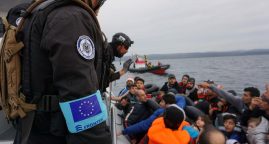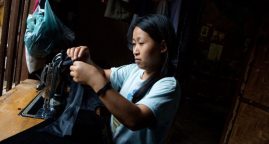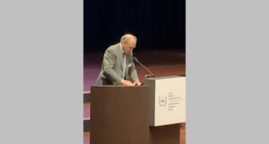Libya’s warring sides reach diplomatic breakthrough in Rome
Article published on The Guardian website on 04/24/2017 by Patrick Wintour
Rome has brokered a diplomatic breakthrough in Libya that has the potential to bring the two main warring sides together in a new political agreement after years of division, fighting and economic misery.
The scale of the breakthrough will be tested later this week, but Italy is hailing a compromise brokered between the presidents of the house of representatives, Ageela Saleh, and the state council, Abdulrahman Sewehli.
The meeting was overseen by the Italian foreign minister, Angelino Alfano, and the Italian ambassador to Libya.
According to a statement from the state council, “there was an atmosphere of friendliness and openness” at the meeting in Rome. The statement also said there would have to be further consultations between the two sides this week in order to bring about reconciliation “and stop the bleeding as well as [ensure] the return of displaced persons”.
The house of representatives led by Saleh has refused to approve a government of national accord based in Tripoli for more than a year until changes are made to the Libyan Political Agreement (LPA), which can only be effected by a joint team from the house and the state council.
The impasse has led to political deadlock and a military standoff between forces in the west and east of the country.
The state council said in a note: “We agreed to reach peaceful and fair solutions to outstanding issues,” a reference to one of the fundamental dilemmas in the Libyan crisis: the military and political role in any unity government of the military commander of forces in the east, Field Marshall Khalifa Haftar.
Saleh, who has been president of the house since August 2014, has been subject to US and EU sanctions since 2016 for stalling and blocking political progress.
It appears Donald Trump, who met the Italian prime minister, Paolo Gentiloni, this week, does not intend to adopt a hands-on role in Libya, in effect ceding the the future of the territory to north African countries, the EU, Russia, Egypt and some Gulf states.
Related Articles
Are NGOs responsible for the migration crisis in the Mediterranean?
06/20/2017. Behind the controversy lies the question of legitimacy. Who has the right to intervene and come to migrants’ rescue?
Where do we go from here? 1st Annual Grand Bargain Meeting
06/20/2017. “Together we were determined to reset our ways of working and refocus our efforts on achieving humanitarian gains” Peter Maurer.
Statement by HE M. Yves Gazzo To The International Criminal Court
12/06/2019. “The Court represents, since its inception, a unique peaceful organization upholding International Law”





